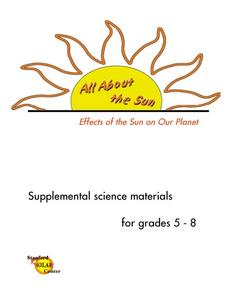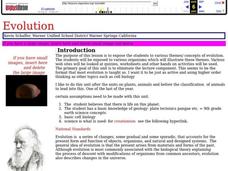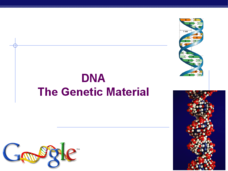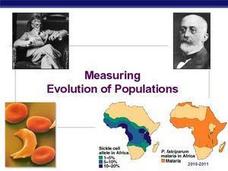Curated OER
What is Life? Demonstrations & Discussion
Display seven items for your biologists to consider. Are they living or non-living? How can you tell? This is a simple outline of what you can display and questions that can be discussed as this topic is explored. One way to use this...
Curated OER
It's Alive! Or is it?
Students differentiate the characteristics of living and nonliving things. In this life science lesson, students compare and contrast robots and living things. Given an object, they decide whether it's is living or not and defend their...
Curated OER
Genetics and Heredity: The Next Generation
Tenth graders work in teams to order events of DNA transcription and translation protein synthesis. In the second lesson, they put the steps of mitosis and meiosis in order using a concept map poster. They use modeling clay to create...
Curated OER
The Virtual Electron Microscope
Students explore the world of the very small using a Flash plug-in Virtual Electron Microscope. They complete and discuss an activity in which unknown samples are placed under the computer simulated microscope to determine where the...
Curated OER
Osmosis and Diffusion: Egg Lab
Students examine why diffusion and osmosis happen in an egg cell. In this diffusion lesson students demonstrate a semi permeable membrane.
Curated OER
The Classification of the Kingdoms of Life
Students can learn about the evolution of science by discussing the classification of living things.
Curated OER
Pond Life
Students explore pond ecosystems. In this living environment lesson, students observe the local pond and identify the living things they find by drawing pictures. Students observe organisms that were found in the pond by using a...
Curated OER
Sponges and Cnidarian Crossword Puzzle
In this marine science activity, students complete a crossword puzzle with 32 questions on sponges and cnidarian. They identify the different characteristics of sponges and cnidarian.
Curated OER
Effects of the Sun on Our Planet
Students examine the effect of different types of light on the Earth. They discover the role of evaporation and the effects of the sun on the magnetosphere. They also observe different solar phenomena.
Curated OER
Science: Entomology in Action
Learners discover how coroners use insect life cycles to estimate the time of death in cases. they describe how forensic entomologists combine environmental factors with insect life cycles to note the changes. Students examine an...
Curated OER
Evolution
Explore the concept of evolution and cell biology; your class can work in groups to use the internet to view websites on evolution, take a quiz, and complete a lab activity.
Virginia Department of Education
Genetic Variation and Mutations
Young scientists demonstrate their creativity while completing several activities, to assess genetic variations and mutations. Instructors provide a list of options and scientists choose to write a comic strip, create a book, construct a...
Curated OER
DNA: The Genetic Material
The various experiments and processes that were completed in the 20th century to further our understanding of DNA are summarized here. There are wonderful slides to popularize the scientists who dedicated their professional life to...
Curated OER
Measuring Evolution of Populations
The Hardy-Weinberg principle is the focus of this concise slideshow. Some vocabulary definitions are given on the first 2 slides, and the rest are given over to examples of the Hardy-Weinberg theorem. Calculations of the H-W principle...
Curated OER
Creative Ways To Teach Evolutionary Concepts
Research how DNA, the genetic blueprint of living organisms, plays an essential role in the continuity of life. High schoolers will summarize how their influence may very well effect the destiny of the population from one generation to...
Curated OER
Regulating the Internal Environment
This presentation begins with the many problems multicellular organisms which rely on diffusion encounter. There are many diagrams of mammalian organ structures, and they are labelled with their relevant functions. This an excellent...
Curated OER
Kingdom: Fungi
The general characteristics that affect classification of fungi and other organisms in the domain Eukarya are detailed for the students on 12 attractive slides. Teachers can access individual slides to cover life cycles or diversity, or...
Curated OER
Cellular Respiration stage 1: Glycolysis
Ten reactions involved with the process of glycolysis within cellular respiration are summarized here. The aerobic stages and anaerobic interactions leading to fermentation are detailed and wonderful diagrams to support the information...
LABScI
Photosynthesis: How Do Plants Get Energy?
Examine the mechanism of photosynthesis through different light scenarios. Pupils vary the amount and type of light exposure on plant leaves in the fifth lesson plan in a 12-part series. Through observation, they determine the rate of...
Serendip
DNA
Get up close and personal with DNA! A two-part hands-on activity has learners extract DNA from a small organism and then their own cheek cells. Scholars then explore DNA replication using questions to guide their analyses.
Curated OER
Plankton in the Air
Here is a lab activity adequate for use with any full lesson on environmental factors that shape animal adaptations or marine animal characteristics. Pupils will discuss the role plankton plays in the environment and filter-feeding...
It's About Time
Newton's Law of Universal Gravitation
While science is looking for correct explanations, pseudoscience often fills in the blanks. Pupils explore the relationship between light distance and intensity and graph their data. Then they compare their data to Newton's Law of...
Curated OER
Scientific Root Words, Prefixes, and Suffixes
It's hard to imagine that anything was missed on this five-page list of science roots, prefixes, and suffixes! Listed in alphabetical order, all are included in a single, two-column list. This may be especially useful for advanced...
Curated OER
LP 6--8: Xenopus laevis (frog) Development for a 7th Grade Audience
Seventh graders view lab stations with Xenopus at different stages of development. They identify the life stage of the sample, as well as the previous and next stages. Students must explain their reason for selecting the specific stage.

























